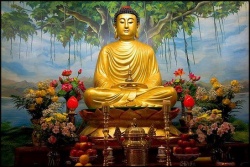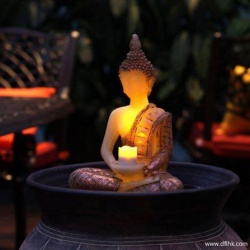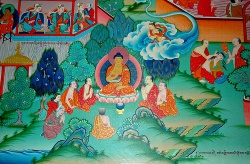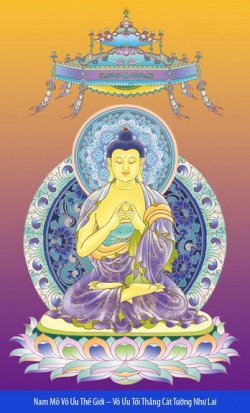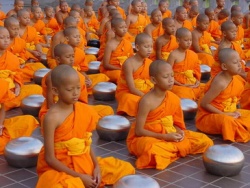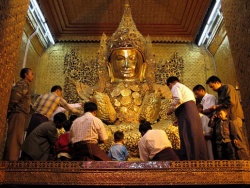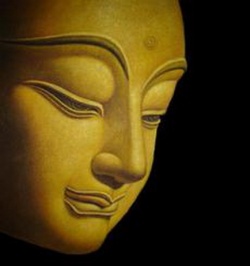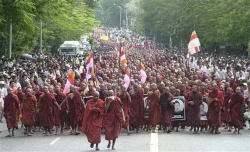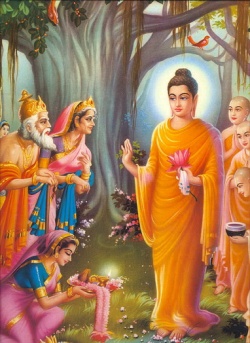Difference between revisions of "Anāthapiṇḍada"
m (Text replace - "result" to "result") |
|||
| (14 intermediate revisions by 5 users not shown) | |||
| Line 1: | Line 1: | ||
[[File:757620 n.jpg|thumb|250px|]] | [[File:757620 n.jpg|thumb|250px|]] | ||
| + | |||
| + | |||
| + | |||
| + | |||
| + | |||
| + | |||
| + | |||
<poem> | <poem> | ||
| − | [[anāthapiṇḍada]] ; piṇḍa-da or m. 'giver of cakes or [[food]] to the poor', N. of a {{Wiki|merchant}} (in whose garden [[Śākyamuni]] used to instruct his [[disciples]]) | + | [[anāthapiṇḍada]] ; piṇḍa-da or m. 'giver of cakes or [[food]] to the poor', N. of a {{Wiki|merchant}} (in whose [[garden]] [[Śākyamuni]] used to instruct his [[disciples]]) |
The [[Conversion]] of [[Anāthapiṇḍada]] | The [[Conversion]] of [[Anāthapiṇḍada]] | ||
| − | + | 1. Then there was an important elder, called [[Anāthapiṇḍada]]. He was enormously wealthy and his riches were countless, but he freely gave {{Wiki|donations}}, saving the poor. | |
| − | 2. He came from far to the north, from the country of [[Kośala]], and was staying in the home of a good friend. His host was called Śūla. | + | 2. He came from far to the [[north]], from the country of [[Kośala]], and was staying in the home of a [[good friend]]. His host was called [[Śūla]]. |
| − | 3. When he [[heard]] that the [[Buddha]] had appeared in the [[world]] and was staying nearby in the Veṇuvana, he went to the grove that very night, having received his name and full esteem for his [[virtues]]. | + | 3. When he [[heard]] that the [[Buddha]] had appeared in the [[world]] and was staying nearby in the Veṇuvana, he went to the grove that very night, having received his [[name]] and full esteem for his [[virtues]]. |
[[File:7137 6732 n.jpg|thumb|250px|]] | [[File:7137 6732 n.jpg|thumb|250px|]] | ||
| − | 4. The [[Tathāgata]] knew that his [[faculties]] were mature and that his [[pure]] [[faith]] had arisen. As fitting, he called him by his real name and expounded the Law to him. | + | 4. The [[Tathāgata]] knew that his [[faculties]] were mature and that his [[pure]] [[faith]] had arisen. As fitting, he called him by his real [[name]] and expounded the [[Law]] to him. |
| − | 5. “You find [[happiness]] in the Right Law, but your [[pure]] [[faith]] has been thirsting in vain. You have given up your [[sleep]] to come and salute me. | + | 5. “You find [[happiness]] in the [[Right Law]], but your [[pure]] [[faith]] has been thirsting in vain. You have given up your [[sleep]] to come and salute me. |
| − | 6. “Today I will fully perform my initial duty of [[hospitality]] to you. The basis of the [[virtue]] you have planted in the past makes my [[pure]] expectations firm. Your [[joy]] upon [[hearing]] the [[Buddha’s]] name makes you fit to be a vessel for the Right Law. | + | 6. “Today I will fully perform my initial [[duty]] of [[hospitality]] to you. The basis of the [[virtue]] you have planted in the {{Wiki|past}} makes my [[pure]] expectations firm. Your [[joy]] upon [[hearing]] the [[Buddha’s]] [[name]] makes you fit to be a vessel for the [[Right Law]]. |
| − | 7. “When one widely practices [[kindness]] in an impartial [[manner]] and provides for the poor all around, one’s famous [[virtue]] becomes widely renowned. The completion of [[fruition]] comes from a previous [[cause]]. I shall now practice the gift of the Law, giving earnestly and sincerely. | + | 7. “When one widely practices [[kindness]] in an impartial [[manner]] and provides for the poor all around, one’s famous [[virtue]] becomes widely renowned. The completion of [[fruition]] comes from a previous [[cause]]. I shall now practice the [[gift]] of the [[Law]], giving earnestly and sincerely. |
| − | 8. “Then I will give the gift of quietude. Fully keep [[pure]] [[morality]]! [[Morality]] is an ornament. It can | + | 8. “Then I will give the [[gift]] of [[quietude]]. Fully keep [[pure]] [[morality]]! [[Morality]] is an ornament. It can change the woeful destinations and it allows one to ascend to [[heaven]], bringing the reward of the [[celestial]] five happinesses.1 |
| − | 9. “Any [[aspiration]] means great [[suffering]], and [[desire]] accumulates all wrongs. Develop the [[virtue]] of [[renunciation]] and the [[happiness]] of quietude, free from [[desire]]! | + | 9. “Any [[aspiration]] means great [[suffering]], and [[desire]] accumulates all wrongs. Develop the [[virtue]] of [[renunciation]] and the [[happiness]] of [[quietude]], free from [[desire]]! |
| − | 10. “[[Know]] that the [[suffering]] of [[old age]], illness, and [[death]] is the greatest calamity in the [[world]]! Through right [[contemplation]] of the [[world]] one leaves [[birth]], [[old age]], illness, and [[death]]. | + | 10. “[[Know]] that the [[suffering]] of [[old age]], {{Wiki|illness}}, and [[death]] is the greatest calamity in the [[world]]! Through right [[contemplation]] of the [[world]] one leaves [[birth]], [[old age]], {{Wiki|illness}}, and [[death]]. |
[[File:78962 n.jpg|thumb|250px|]] | [[File:78962 n.jpg|thumb|250px|]] | ||
| − | 11. “You have seen that [[humans]] have the [[suffering]] of [[old age]], illness, and [[death]]. The same applies to [[rebirth]] in [[heaven]]. There is no one who permanently stays. | + | 11. “You have seen that [[humans]] have the [[suffering]] of [[old age]], {{Wiki|illness}}, and [[death]]. The same applies to [[rebirth]] in [[heaven]]. There is no one who permanently stays. |
12. “The [[impermanent]] means [[suffering]], and the [[painful]] is without a [[self]]. What is [[painful]] in [[impermanence]] is not a [[self]]. How could there be an ‘I’ or ‘mine’? | 12. “The [[impermanent]] means [[suffering]], and the [[painful]] is without a [[self]]. What is [[painful]] in [[impermanence]] is not a [[self]]. How could there be an ‘I’ or ‘mine’? | ||
| − | 13. “[[Know]] that the [[painful]] is [[nothing]] but [[suffering]]! When it is accumulated, it is a [[cause]]. The [[extinction]] of [[suffering]] means quietude, and the [[path]] is the place of [[tranquility]]. | + | 13. “[[Know]] that the [[painful]] is [[nothing]] but [[suffering]]! When it is [[accumulated]], it is a [[cause]]. The [[extinction]] of [[suffering]] means [[quietude]], and the [[path]] is the place of [[tranquility]]. |
| − | 14. “[[Beings]] keep cycling [in [[birth]] and [[death]] | + | 14. “[[Beings]] keep cycling [in [[birth]] and [[death]]) by [[nature]]. [[Know]] that this is the basis of [[suffering]]! Disgusted with the end and trying to block its origin, one may not wish for any [[existence]] or [[Wikipedia:Existence|nonexistence]]! |
15. “The great fires of [[birth]], [[old age]], and [[death]] are burning all around in the [[world]]. [[Seeing]] that [[birth]] and [[death]] is unsteady, one should develop freedom from its notion. [[Samādhi]] completely achieves the quiet place of [[immortality]]. | 15. “The great fires of [[birth]], [[old age]], and [[death]] are burning all around in the [[world]]. [[Seeing]] that [[birth]] and [[death]] is unsteady, one should develop freedom from its notion. [[Samādhi]] completely achieves the quiet place of [[immortality]]. | ||
[[File:(Kammatth.jpg|thumb|250px|]] | [[File:(Kammatth.jpg|thumb|250px|]] | ||
| − | 16. “[[Empty]] and without ‘I’ or ‘mine,’ the whole [[world]] is like an [[illusion]]. Observe this [[body]] as a multitude of [[great elements]] and a mass of formations!” | + | 16. “[[Empty]] and without ‘I’ or ‘mine,’ the whole [[world]] is like an [[illusion]]. Observe this [[body]] as a multitude of [[great elements]] and a {{Wiki|mass}} of [[formations]]!” |
| − | 17. When the elder [[Anāthapiṇḍada]] [[heard]] the exposition of the Law, he immediately obtained the first fruition.2 The sea of [[birth]] and [[death]] was eliminated. There was just one drop left. | + | 17. When the elder [[Anāthapiṇḍada]] [[heard]] the [[exposition]] of the [[Law]], he immediately obtained the first fruition.2 The sea of [[birth]] and [[death]] was eliminated. There was just one drop left. |
| − | 18. “One may practice [[renunciation]] in {{Wiki|seclusion}} or be free from the [[body]] in the highest existence.3 It is better to be truly delivered by [[seeing]] the [[truths]] now as a common [[person]]. | + | 18. “One may practice [[renunciation]] in {{Wiki|seclusion}} or be free from the [[body]] in the [[highest]] existence.3 It is better to be truly delivered by [[seeing]] the [[truths]] now as a common [[person]]. |
| − | 19. “If one is not free from the [[suffering]] of the formations and from the net of all kinds of strange [[views]], one does not see the meaning of the [[truth]], even though one may reach the highest [[existence]]. Wrong notions are attached to [[celestial]] [[merit]], since the bond of [[desire]] for [[existence]] becomes increasingly stronger.” | + | 19. “If one is not free from the [[suffering]] of the [[formations]] and from the net of all kinds of strange [[views]], one does not see the meaning of the [[truth]], even though one may reach the [[highest]] [[existence]]. Wrong notions are [[attached]] to [[celestial]] [[merit]], since the bond of [[desire]] for [[existence]] becomes increasingly stronger.” |
| − | 20. When the elder [[Anāthapiṇḍada]] [[heard]] the exposition of the Law, the darkness of obscuration opened up in a bright way. He consequently obtained the [[right view]] and all [[wrong views]] were forever removed, just as a strong autumn wind scatters heavy clouds. | + | 20. When the elder [[Anāthapiṇḍada]] [[heard]] the [[exposition]] of the [[Law]], the {{Wiki|darkness}} of {{Wiki|obscuration}} opened up in a bright way. He consequently obtained the [[right view]] and all [[wrong views]] were forever removed, just as a strong autumn [[wind]] scatters heavy clouds. |
| − | 21. “He did not consider Īśvara as the [[cause]] for the production of the [[world]], nor was it the case that it was produced by a wrong [[cause]], neither was it uncaused.4 | + | 21. “He did not consider [[Īśvara]] as the [[cause]] for the production of the [[world]], nor was it the case that it was produced by a wrong [[cause]], neither was it uncaused.4 |
[[File:7de.jpg|thumb|250px|]] | [[File:7de.jpg|thumb|250px|]] | ||
| − | 22. “If [the [[world]] | + | 22. “If [the [[world]]) were produced by [[Īśvara]], there would be no old or young, first or last. There would be no [[wheel]] of the [[five destinations]]. The born would not be [[extinguished]]. |
| − | 23. “And there would be no calamities. Doing [[evil]] would not be wrong. [[Pure]] or [[impure]] [[actions]] would come from the [[god]] Īśvara. | + | 23. “And there would be no {{Wiki|calamities}}. Doing [[evil]] would not be wrong. [[Pure]] or [[impure]] [[actions]] would come from the [[god]] [[Īśvara]]. |
| − | 24. “If the [[world]] were produced by the [[god]] Īśvara, he would not be doubted, just as the son is produced by the father. Who would not be [[conscious]] of his honored one? | + | 24. “If the [[world]] were produced by the [[god]] [[Īśvara]], he would not be doubted, just as the son is produced by the father. Who would not be [[conscious]] of his [[honored one]]? |
| − | 25. “When one met with [[suffering]], one would not on the other hand resent the [[god]]. All would {{Wiki|honor}} Īśvara, and would serve no other [[spirit]]. | + | 25. “When one met with [[suffering]], one would not on the other hand resent the [[god]]. All would {{Wiki|honor}} [[Īśvara]], and would serve no other [[spirit]]. |
| − | 26. “If Īśvara were the maker, he would not be called “Sovereign.” But as a maker he would constantly have to produce. If he were constantly producing, he would himself toil. Why then call him “Sovereign”? | + | 26. “If [[Īśvara]] were the maker, he would not be called “Sovereign.” But as a maker he would constantly have to produce. If he were constantly producing, he would himself toil. Why then call him “Sovereign”? |
| − | 27. “He would either produce unwittingly, as the [[action]] of an infant, or produce intentionally. If he had the {{Wiki|intention}} [to produce] he would not be sovereign. | + | 27. “He would either produce unwittingly, as the [[action]] of an {{Wiki|infant}}, or produce intentionally. If he had the {{Wiki|intention}} [to produce] he would not be sovereign. |
| − | 28. “If [[suffering]] or [[happiness]] came from [[beings]], then these are not made by Īśvara. If Īśvara produces [[suffering]] or [[happiness]], he would have [[love]] or [[hate]]. Because he would have [[love]] or [[hate]], he should not be called “Sovereign.” 29. “If, furthermore, a sovereign were active, [[beings]] would be [[silent]]. Confiding in his sovereign [[power]], what would be the use of practicing good? One just might practice good or [[evil]] but would not have the retribution of the [[action]]. | + | 28. “If [[suffering]] or [[happiness]] came from [[beings]], then these are not made by [[Īśvara]]. If [[Īśvara]] produces [[suffering]] or [[happiness]], he would have [[love]] or [[hate]]. Because he would have [[love]] or [[hate]], he should not be called “Sovereign.” 29. “If, furthermore, a sovereign were active, [[beings]] would be [[silent]]. Confiding in his sovereign [[power]], what would be the use of practicing good? One just might practice good or [[evil]] but would not have the retribution of the [[action]]. |
[[File:-008.jpg|thumb|250px|]] | [[File:-008.jpg|thumb|250px|]] | ||
| − | 30. “If sovereignty were produced by [[actions]], all would be [[actions]] in common [with [[human beings]] | + | 30. “If {{Wiki|sovereignty}} were produced by [[actions]], all would be [[actions]] in common [with [[human beings]]). If they were [[actions]] in common, all would be called sovereigns. |
| − | 31. “If Īśvara were uncaused, all would be nonexistent too. If he would rely on another sovereign, then the number of sovereigns would be without end. | + | 31. “If [[Īśvara]] were uncaused, all would be [[Wikipedia:Nothing|nonexistent]] too. If he would rely on another sovereign, then the number of sovereigns would be without end. |
| − | 32. “That is why [[beings]] all have no maker. [[Know]] that the meaningfulness of a sovereign is destroyed in this [[discussion]]! All meanings are mutually contradicted. If there is no explanation, there is an | + | 32. “That is why [[beings]] all have no maker. [[Know]] that the meaningfulness of a sovereign is destroyed in this [[discussion]]! All meanings are mutually contradicted. If there is no explanation, there is an error. |
| − | 33. “If furthermore a specific nature5 were to produce, the | + | 33. “If furthermore a specific nature5 were to produce, the error would be the same. Those who understand the theories of [[causality]] have never given such explanation. |
34. “One could have things that are made without any basis or [[cause]], but they all come from a [[cause]], as if relying on a seed. Therefore, [[know]] that [[nothing]] is produced by a specific [[nature]]! | 34. “One could have things that are made without any basis or [[cause]], but they all come from a [[cause]], as if relying on a seed. Therefore, [[know]] that [[nothing]] is produced by a specific [[nature]]! | ||
| Line 78: | Line 85: | ||
37. “If it were in all places and all would have a maker, it would be the case then that at all times, constantly, there is something [[being]] made. | 37. “If it were in all places and all would have a maker, it would be the case then that at all times, constantly, there is something [[being]] made. | ||
| − | 38. “If one mentions a constant maker, there would be no waiting for the right [[time]] to produce an [[object]]. Therefore, [[know]] that it is not the case that a specific [[nature]] is the [[cause]]! | + | 38. “If one mentions a [[constant]] maker, there would be no waiting for the right [[time]] to produce an [[object]]. Therefore, [[know]] that it is not the case that a specific [[nature]] is the [[cause]]! |
| − | 39. “When they further explain that this specific [[nature]] is free from any attributes,6 all things that are made should be free from attributes too. | + | 39. “When they further explain that this specific [[nature]] is free from any attributes,6 all things that are made should be free from [[attributes]] too. |
| − | 40. “But all the [[worldly]] is seen to possess attributes. Therefore, [[know]] that the specific [[nature]] again is no [[cause]]! | + | 40. “But all the [[worldly]] is seen to possess [[attributes]]. Therefore, [[know]] that the specific [[nature]] again is no [[cause]]! |
| − | 41. “If one explains that the specific [[nature]] is different from an attribute, its [[nature]] should not be different, since one would consider something permanent as [[cause]]. | + | 41. “If one explains that the specific [[nature]] is different from an attribute, its [[nature]] should not be different, since one would consider something [[permanent]] as [[cause]]. |
| − | 42. “Because [[beings]] are different from their attributes, the specific [[nature]] is no [[cause]]. If the specific [[nature]] were permanent, things would not be destroyed. | + | 42. “Because [[beings]] are different from their [[attributes]], the specific [[nature]] is no [[cause]]. If the specific [[nature]] were [[permanent]], things would not be destroyed. |
| − | 43. “Considering the specific [[nature]] to be a [[cause]], [[cause and effect]] would in principle be the same. Because the [[worldly]] is destroyed, [[know]] that it has another [[cause]]! | + | 43. “Considering the specific [[nature]] to be a [[cause]], [[cause and effect]] would in [[principle]] be the same. Because the [[worldly]] is destroyed, [[know]] that it has another [[cause]]! |
[[File:-lent-.jpg|thumb|250px|]] | [[File:-lent-.jpg|thumb|250px|]] | ||
44. “If it were [[caused]] by a specific [[nature]], one would not seek [[deliverance]]. As it would have a specific [[nature]], it would allow its [[birth]] and [[extinction]]. Even if one had obtained [[deliverance]], the specific [[nature]] would yet produce bonds. | 44. “If it were [[caused]] by a specific [[nature]], one would not seek [[deliverance]]. As it would have a specific [[nature]], it would allow its [[birth]] and [[extinction]]. Even if one had obtained [[deliverance]], the specific [[nature]] would yet produce bonds. | ||
| − | 45. “If the specific [[nature]] was invisible but was the [[cause]] for [[visible]] factors, it would not yet be a [[cause]], because [[cause and effect]] would in principle be different. For all [[visible]] things in the [[world]] both [[cause and effect]] are [[visible]]. | + | 45. “If the specific [[nature]] was {{Wiki|invisible}} but was the [[cause]] for [[visible]] factors, it would not yet be a [[cause]], because [[cause and effect]] would in [[principle]] be different. For all [[visible]] things in the [[world]] both [[cause and effect]] are [[visible]]. |
46. “If a specific [[nature]] were unwitting, it would not be the [[cause]] of something with an {{Wiki|intention}}. Just as upon [[seeing]] smoke one [[knows]] of the [[fire]], [[cause and effect]] are mutually dependent. | 46. “If a specific [[nature]] were unwitting, it would not be the [[cause]] of something with an {{Wiki|intention}}. Just as upon [[seeing]] smoke one [[knows]] of the [[fire]], [[cause and effect]] are mutually dependent. | ||
| − | 47. “It is not the case that the [[cause]] is invisible but that it would produce something [[visible]]. When, for instance, {{Wiki|gold}} is made into vessels and [[robes]], throughout they are not separate from {{Wiki|gold}}. If the specific [[nature]] were a [[cause]] for something, why would it be different throughout? | + | 47. “It is not the case that the [[cause]] is {{Wiki|invisible}} but that it would produce something [[visible]]. When, for instance, {{Wiki|gold}} is made into vessels and [[robes]], throughout they are not separate from {{Wiki|gold}}. If the specific [[nature]] were a [[cause]] for something, why would it be different throughout? |
| − | 48. “If [[time]] were a maker, one should not seek for [[deliverance]]. Because [[time]] is permanent, one should let [[time]] be. | + | 48. “If [[time]] were a maker, one should not seek for [[deliverance]]. Because [[time]] is [[permanent]], one should let [[time]] be. |
| − | 49. “The [[world]] would be endless, and the same would apply to [[time]]. And so, a practitioner should not apply himself to it and strive. | + | 49. “The [[world]] would be [[endless]], and the same would apply to [[time]]. And so, a [[practitioner]] should not apply himself to it and strive. |
[[File:871830 n.jpg|thumb|250px|]] | [[File:871830 n.jpg|thumb|250px|]] | ||
50. “Entities7 and attributes—the [[world]] discusses them as [[being]] the same or different. Even though there are several kinds of theories, [[know]] that they are not one [[cause]]. | 50. “Entities7 and attributes—the [[world]] discusses them as [[being]] the same or different. Even though there are several kinds of theories, [[know]] that they are not one [[cause]]. | ||
| Line 118: | Line 125: | ||
57. “With or without any {{Wiki|intention}}, all arises from [[causes]] and [[conditions]]. No factor in the [[world]] is produced uncaused.” | 57. “With or without any {{Wiki|intention}}, all arises from [[causes]] and [[conditions]]. No factor in the [[world]] is produced uncaused.” | ||
| − | 58. | + | 58. ([[Hearing]] this,] the elder [[Anāthapiṇḍada]]’s [[mind]] opened up and he had thorough [[insight]] into the exquisite meaning. [[Knowledge]] of the unique [[reality]] arose, and he decidedly understood the [[truth]]. He [[bowed]] at the Worldhonored One’s feet, held his palms together, and stated his request: |
| − | 59. “I [[live]] in [[Śrāvastī]]. The land is rich and [[happy]]. Its great [[king]] Pra senajit is a descendant of the family of Haryaśva. His [[meritorious]] [[virtue]] and [[fame]] are renowned. He is honored near and far. | + | 59. “I [[live]] in [[Śrāvastī]]. The land is rich and [[happy]]. Its great [[king]] Pra senajit is a descendant of the [[family]] of Haryaśva. His [[meritorious]] [[virtue]] and [[fame]] are renowned. He is honored near and far. |
| − | 60. “I do wish to establish a [[pure abode]]. I do wish you would mercifully accept it! I [[know]] that in your [[mind]], O [[Buddha]], [all] is equal. You do not seek {{Wiki|comfort}} where you dwell, but may you not disregard my invitation, out of [[sympathy]] for [[beings]]?” | + | 60. “I do wish to establish a [[pure abode]]. I do wish you would mercifully accept it! I [[know]] that in your [[mind]], O [[Buddha]], [all] is {{Wiki|equal}}. You do not seek {{Wiki|comfort}} where you dwell, but may you not [[disregard]] my invitation, out of [[sympathy]] for [[beings]]?” |
61. The [[Buddha]] knew the elder’s {{Wiki|intention}}. A great donation would now be made. Untainted and unattached, he skillfully guarded the {{Wiki|intention}} of [[beings]]. | 61. The [[Buddha]] knew the elder’s {{Wiki|intention}}. A great donation would now be made. Untainted and unattached, he skillfully guarded the {{Wiki|intention}} of [[beings]]. | ||
| − | 62. “You have seen the [[truth]]. In your actual {{Wiki|intention}} you wish to practice [[generosity]]. [[Money]] is no permanent [[treasure]]. One should quickly donate it. | + | 62. “You have seen the [[truth]]. In your actual {{Wiki|intention}} you wish to practice [[generosity]]. [[Money]] is no [[permanent]] [[treasure]]. One should quickly donate it. |
[[File:87250-84352.jpg|thumb|250px|]] | [[File:87250-84352.jpg|thumb|250px|]] | ||
| − | 63. “When, for instance, one’s treasury burns down, what has been taken out is precious. A bright [[person]] [[knows]] about [[impermanence]], and by donating his riches he extensively practices [[kindness]]. | + | 63. “When, for instance, one’s treasury burns down, what has been taken out is [[precious]]. A bright [[person]] [[knows]] about [[impermanence]], and by donating his riches he extensively practices [[kindness]]. |
| − | 64. “The stingy are parsimonious. They do not enjoy [their [[wealth]] | + | 64. “The stingy are parsimonious. They do not enjoy [their [[wealth]]) for {{Wiki|fear}} of its [[extinction]], and they are not afraid of [[impermanence]]. Simple loss increases their mournfulness. |
| − | 65. “When donating at the right [[time]] and to a proper recipient, one is like a vigorous man facing an | + | 65. “When donating at the right [[time]] and to a proper recipient, one is like a vigorous man facing an enemy. Able in [[generosity]] and able in {{Wiki|battle}}, he is a valiant and [[wise]] [[person]]. |
| − | 66. “One who donates is loved by all. He is well praised and widely renowned. The [[virtuous]] are [[happy]] to be his friend, and when his [[life]] ends his [[thoughts]] are always [[joyful]]. | + | 66. “One who donates is loved by all. He is well praised and widely renowned. The [[virtuous]] are [[happy]] to be his [[friend]], and when his [[life]] ends his [[thoughts]] are always [[joyful]]. |
| − | 67. “Free from [[regret]] and {{Wiki|fear}}, he is not [[reborn]] in the destination of [[hungry ghosts]]. Here he is recompensed with flowers, but his [[fruition]] is hard to conceive. | + | 67. “Free from [[regret]] and {{Wiki|fear}}, he is not [[reborn]] in the destination of [[hungry ghosts]]. Here he is recompensed with [[flowers]], but his [[fruition]] is hard to [[conceive]]. |
[[File:-post-123.jpg|thumb|250px|]] | [[File:-post-123.jpg|thumb|250px|]] | ||
68. “While revolving in the six destinations, no finer companion surpasses [[generosity]]. If one is [[reborn]] among [[gods]] or [[humans]], one is served by all. [[Reborn]] in the [[animal]] destination, [[generosity]] is recompensed and one will accordingly [[experience]] [[happiness]]. | 68. “While revolving in the six destinations, no finer companion surpasses [[generosity]]. If one is [[reborn]] among [[gods]] or [[humans]], one is served by all. [[Reborn]] in the [[animal]] destination, [[generosity]] is recompensed and one will accordingly [[experience]] [[happiness]]. | ||
| Line 146: | Line 153: | ||
71. “As [[samādhi]] increases [[wisdom]], one can correctly [[contemplate]] [[birth]] and [[extinction]]. Having correctly contemplated [[birth]] and [[extinction]], one in due [[order]] obtains [[deliverance]]. | 71. “As [[samādhi]] increases [[wisdom]], one can correctly [[contemplate]] [[birth]] and [[extinction]]. Having correctly contemplated [[birth]] and [[extinction]], one in due [[order]] obtains [[deliverance]]. | ||
| − | 72. “If one is generous, giving up one’s riches, one does away with [[attachment]]. If one is [[compassionate]] and gives reverentially, one completely removes [[jealousy]] and | + | 72. “If one is generous, giving up one’s riches, one does away with [[attachment]]. If one is [[compassionate]] and gives reverentially, one completely removes [[jealousy]] and {{Wiki|pride}}. One clearly sees the result of [[generosity]], but without [[generosity]] one is deluded and [[insight]] is done away with. |
[[File:8Buddha2.jpg|thumb|250px|]] | [[File:8Buddha2.jpg|thumb|250px|]] | ||
73. “The [[extinction]] of all [[fetters]] and afflictions—this comes from [[generosity]]. [[Know]] that [[generosity]] is a [[cause]] for [[deliverance]]! | 73. “The [[extinction]] of all [[fetters]] and afflictions—this comes from [[generosity]]. [[Know]] that [[generosity]] is a [[cause]] for [[deliverance]]! | ||
| − | 74. “Just as someone grows [[plants]] or flowers and [[fruits]] for their shade, the same applies to [[generosity]]. The [[happiness]] of its reward is great [[nirvana]]. When riches, which are not solid, are donated, the reward one obtains is a solid [[fruition]]. | + | 74. “Just as someone grows [[plants]] or [[flowers]] and [[fruits]] for their shade, the same applies to [[generosity]]. The [[happiness]] of its reward is great [[nirvana]]. When riches, which are not solid, are donated, the reward one obtains is a solid [[fruition]]. |
| − | 75. “When donating [[food]], yes, one gains strength; and when donating clothing, one obtains beauty. When one establishes a [[pure abode]], all [[fruitions]] are fully accomplished. | + | 75. “When donating [[food]], yes, one gains strength; and when donating clothing, one obtains [[beauty]]. When one establishes a [[pure abode]], all [[fruitions]] are [[fully accomplished]]. |
| − | 76. “Some donate seeking the [[five desires]], and some wish for greater riches. Some donate for [[fame]]. There are those who seek the [[happiness]] of [[rebirth]] in [[heaven]]. Some want to avoid poverty. Only you donate without any [such] {{Wiki|intention}}. | + | 76. “Some donate seeking the [[five desires]], and some wish for greater riches. Some donate for [[fame]]. There are those who seek the [[happiness]] of [[rebirth]] in [[heaven]]. Some want to avoid {{Wiki|poverty}}. Only you donate without any [such] {{Wiki|intention}}. |
| − | 77. “The highest among generosities is not obtained without benefit. If you want to be magnanimous, let it be quickly accomplished! You came deluded and with [[desire]] in your [[heart]], but you will return after the [[eye]] of [[purity]] has opened up.” | + | 77. “The [[highest]] among generosities is not obtained without [[benefit]]. If you want to be magnanimous, let it be quickly accomplished! You came deluded and with [[desire]] in your [[heart]], but you will return after the [[eye]] of [[purity]] has opened up.” |
| − | 78. The elder [[Anāthapiṇḍada]] accepted the [[Buddha’s]] instruction, and his generous [[mind]] became increasingly clear. He invited Upatiṣya, his [[worthy]] friend, to return with him. | + | 78. The elder [[Anāthapiṇḍada]] accepted the [[Buddha’s]] instruction, and his generous [[mind]] became increasingly clear. He invited Upatiṣya, his [[worthy]] [[friend]], to return with him. |
| − | 79. When he had gone back to [[Kośala]], he went all around to choose a fine site. He saw the garden of Crown {{Wiki|Prince}} [[Jeta]], the grove and the streams utterly clear and quiet. | + | 79. When he had gone back to [[Kośala]], he went all around to choose a fine site. He saw the [[garden]] of {{Wiki|Crown}} {{Wiki|Prince}} [[Jeta]], the grove and the streams utterly clear and quiet. |
| − | 80. He went to the crown {{Wiki|prince}} and asked for | + | 80. He went to the {{Wiki|crown}} {{Wiki|prince}} and asked for permission to buy the grounds. The {{Wiki|crown}} {{Wiki|prince}} greatly valued the place and at first did not have any {{Wiki|intention}} to sell. |
81. “If you were to cover it entirely with {{Wiki|gold}}, still the land would not be given!” The elder, with [[joy]] in his [[heart]], immediately spread out {{Wiki|gold}} all around. | 81. “If you were to cover it entirely with {{Wiki|gold}}, still the land would not be given!” The elder, with [[joy]] in his [[heart]], immediately spread out {{Wiki|gold}} all around. | ||
| − | 82. [[Jeta]] said, “I will not allow it. Why do you spread out all this {{Wiki|gold}}?” The elder [[Anāthapiṇḍada]] said, “If you will not | + | 82. [[Jeta]] said, “I will not allow it. Why do you spread out all this {{Wiki|gold}}?” The elder [[Anāthapiṇḍada]] said, “If you will not permit it, why did you say to cover [the land] with {{Wiki|gold}}?” |
| − | 83. As both men contended thus, they went to the magistrate to decide the matter. All sighed, [[thinking]] that it was amazing, and [[Jeta]] too knew that [[Anāthapiṇḍada]] was sincere. | + | 83. As both men contended thus, they went to the magistrate to decide the {{Wiki|matter}}. All sighed, [[thinking]] that it was amazing, and [[Jeta]] too knew that [[Anāthapiṇḍada]] was {{Wiki|sincere}}. |
84. Having made extensive inquiries about his [[reasons]], it was said that “He will establish a [[pure abode]], and offer it to the [[Tathāgata]] and the [[order]] of [[bhikṣus]].” | 84. Having made extensive inquiries about his [[reasons]], it was said that “He will establish a [[pure abode]], and offer it to the [[Tathāgata]] and the [[order]] of [[bhikṣus]].” | ||
| − | 85. When the crown {{Wiki|prince}} [[heard]] the [[Buddha’s]] name, his [[mind]] immediately understood. He accepted only half the {{Wiki|gold}}, and peacefully negotiating, they established [the place] together. | + | 85. When the {{Wiki|crown}} {{Wiki|prince}} [[heard]] the [[Buddha’s]] [[name]], his [[mind]] immediately understood. He accepted only half the {{Wiki|gold}}, and peacefully negotiating, they established [the place] together. |
86. “Let us together bring [[offerings]] to the Buddha—you the land and I the grove!” The elder [[Anāthapiṇḍada]] handed over the land to [[Śāriputra]], and [[Jeta]] [donated] the grove. | 86. “Let us together bring [[offerings]] to the Buddha—you the land and I the grove!” The elder [[Anāthapiṇḍada]] handed over the land to [[Śāriputra]], and [[Jeta]] [donated] the grove. | ||
| − | 87. | + | 87. ([[Śāriputra]]) planned and began construction of a [[pure abode]]. Night and day they worked and it was quickly completed. [The place] was prominent and excellently adorned, like the palace of the four [[celestial]] {{Wiki|kings}}. |
| − | 88. They followed the rules and complied with the [[propriety]] of the [[path]] in accord with what was fitting for a [[Tathāgata]]. A wonder in the [[world]], [the place] increased the brilliance of the city of [[Śrāvastī]]. | + | 88. They followed the {{Wiki|rules}} and complied with the [[propriety]] of the [[path]] in accord with what was fitting for a [[Tathāgata]]. A [[wonder]] in the [[world]], [the place] increased the [[brilliance]] of the city of [[Śrāvastī]]. |
| − | 89. As the [[Tathāgata]] showed his [[divine]] [[shelter]], all [[noble ones]] gathered for the summer [[retreat]]. The one without attendants10 mercifully descended, and, having attendants, the | + | 89. As the [[Tathāgata]] showed his [[divine]] [[shelter]], all [[noble ones]] [[gathered]] for the summer [[retreat]]. The one without attendants10 mercifully descended, and, having attendants, the ([[noble ones]]) contributed to the [[propriety]] of the [[path]]. |
90. Because of this [[merit]], the elder [[Anāthapiṇḍada]] ascended to [[heaven]] when his [[life]] ended. His sons and grandsons continued his inheritance, planting the field of [[merit]] for generations. | 90. Because of this [[merit]], the elder [[Anāthapiṇḍada]] ascended to [[heaven]] when his [[life]] ended. His sons and grandsons continued his inheritance, planting the field of [[merit]] for generations. | ||
- FOOTNOTES: | - FOOTNOTES: | ||
| − | + | 1. | |
I.e., fulfillment of the [[celestial]] [[five desires]]. | I.e., fulfillment of the [[celestial]] [[five desires]]. | ||
| Line 193: | Line 200: | ||
3. | 3. | ||
| − | In the highest of the four immaterial attainments, also known as the highest [[existence]] ([[bhavāgra]]). | + | In the [[highest]] of the four {{Wiki|immaterial}} [[attainments]], also known as the [[highest]] [[existence]] ([[bhavāgra]]). |
4. | 4. | ||
| Line 202: | Line 209: | ||
6. | 6. | ||
| − | Attribute: [[guṇa]]. See Chapter XII, [[stanza]] 62, and note 56. | + | Attribute: [[guṇa]]. See [[Chapter]] XII, [[stanza]] 62, and note 56. |
7. | 7. | ||
| − | This means a substantial entity ([[dravya]]). In Chapter XII, [[stanza]] 64, the term guṇin is used. The text does not explicitly mention the three attributes ([[guṇas]]) of [[Sāṃkhya]]. | + | This means a substantial [[entity]] ([[dravya]]). In [[Chapter]] XII, [[stanza]] 64, the term guṇin is used. The text does not explicitly mention the three [[attributes]] ([[guṇas]]) of [[Sāṃkhya]]. |
8. | 8. | ||
Latest revision as of 10:21, 17 April 2024
anāthapiṇḍada ; piṇḍa-da or m. 'giver of cakes or food to the poor', N. of a merchant (in whose garden Śākyamuni used to instruct his disciples)
The Conversion of Anāthapiṇḍada
1. Then there was an important elder, called Anāthapiṇḍada. He was enormously wealthy and his riches were countless, but he freely gave donations, saving the poor.
2. He came from far to the north, from the country of Kośala, and was staying in the home of a good friend. His host was called Śūla.
3. When he heard that the Buddha had appeared in the world and was staying nearby in the Veṇuvana, he went to the grove that very night, having received his name and full esteem for his virtues.
4. The Tathāgata knew that his faculties were mature and that his pure faith had arisen. As fitting, he called him by his real name and expounded the Law to him.
5. “You find happiness in the Right Law, but your pure faith has been thirsting in vain. You have given up your sleep to come and salute me.
6. “Today I will fully perform my initial duty of hospitality to you. The basis of the virtue you have planted in the past makes my pure expectations firm. Your joy upon hearing the Buddha’s name makes you fit to be a vessel for the Right Law.
7. “When one widely practices kindness in an impartial manner and provides for the poor all around, one’s famous virtue becomes widely renowned. The completion of fruition comes from a previous cause. I shall now practice the gift of the Law, giving earnestly and sincerely.
8. “Then I will give the gift of quietude. Fully keep pure morality! Morality is an ornament. It can change the woeful destinations and it allows one to ascend to heaven, bringing the reward of the celestial five happinesses.1
9. “Any aspiration means great suffering, and desire accumulates all wrongs. Develop the virtue of renunciation and the happiness of quietude, free from desire!
10. “Know that the suffering of old age, illness, and death is the greatest calamity in the world! Through right contemplation of the world one leaves birth, old age, illness, and death.
11. “You have seen that humans have the suffering of old age, illness, and death. The same applies to rebirth in heaven. There is no one who permanently stays.
12. “The impermanent means suffering, and the painful is without a self. What is painful in impermanence is not a self. How could there be an ‘I’ or ‘mine’?
13. “Know that the painful is nothing but suffering! When it is accumulated, it is a cause. The extinction of suffering means quietude, and the path is the place of tranquility.
14. “Beings keep cycling [in birth and death) by nature. Know that this is the basis of suffering! Disgusted with the end and trying to block its origin, one may not wish for any existence or nonexistence!
15. “The great fires of birth, old age, and death are burning all around in the world. Seeing that birth and death is unsteady, one should develop freedom from its notion. Samādhi completely achieves the quiet place of immortality.
16. “Empty and without ‘I’ or ‘mine,’ the whole world is like an illusion. Observe this body as a multitude of great elements and a mass of formations!”
17. When the elder Anāthapiṇḍada heard the exposition of the Law, he immediately obtained the first fruition.2 The sea of birth and death was eliminated. There was just one drop left.
18. “One may practice renunciation in seclusion or be free from the body in the highest existence.3 It is better to be truly delivered by seeing the truths now as a common person.
19. “If one is not free from the suffering of the formations and from the net of all kinds of strange views, one does not see the meaning of the truth, even though one may reach the highest existence. Wrong notions are attached to celestial merit, since the bond of desire for existence becomes increasingly stronger.”
20. When the elder Anāthapiṇḍada heard the exposition of the Law, the darkness of obscuration opened up in a bright way. He consequently obtained the right view and all wrong views were forever removed, just as a strong autumn wind scatters heavy clouds.
21. “He did not consider Īśvara as the cause for the production of the world, nor was it the case that it was produced by a wrong cause, neither was it uncaused.4
22. “If [the world) were produced by Īśvara, there would be no old or young, first or last. There would be no wheel of the five destinations. The born would not be extinguished.
23. “And there would be no calamities. Doing evil would not be wrong. Pure or impure actions would come from the god Īśvara.
24. “If the world were produced by the god Īśvara, he would not be doubted, just as the son is produced by the father. Who would not be conscious of his honored one?
25. “When one met with suffering, one would not on the other hand resent the god. All would honor Īśvara, and would serve no other spirit.
26. “If Īśvara were the maker, he would not be called “Sovereign.” But as a maker he would constantly have to produce. If he were constantly producing, he would himself toil. Why then call him “Sovereign”?
27. “He would either produce unwittingly, as the action of an infant, or produce intentionally. If he had the intention [to produce] he would not be sovereign.
28. “If suffering or happiness came from beings, then these are not made by Īśvara. If Īśvara produces suffering or happiness, he would have love or hate. Because he would have love or hate, he should not be called “Sovereign.” 29. “If, furthermore, a sovereign were active, beings would be silent. Confiding in his sovereign power, what would be the use of practicing good? One just might practice good or evil but would not have the retribution of the action.
30. “If sovereignty were produced by actions, all would be actions in common [with human beings). If they were actions in common, all would be called sovereigns.
31. “If Īśvara were uncaused, all would be nonexistent too. If he would rely on another sovereign, then the number of sovereigns would be without end.
32. “That is why beings all have no maker. Know that the meaningfulness of a sovereign is destroyed in this discussion! All meanings are mutually contradicted. If there is no explanation, there is an error.
33. “If furthermore a specific nature5 were to produce, the error would be the same. Those who understand the theories of causality have never given such explanation.
34. “One could have things that are made without any basis or cause, but they all come from a cause, as if relying on a seed. Therefore, know that nothing is produced by a specific nature!
35. “All that is made is not just produced by one cause. But because one specific nature is mentioned, it is not the cause.
36. “Or [suppose] one says that the specific nature completely fills all places. If it were to completely fill all, there would be no maker or that which is made. And if there is no maker or that which is made, it is not a cause.
37. “If it were in all places and all would have a maker, it would be the case then that at all times, constantly, there is something being made.
38. “If one mentions a constant maker, there would be no waiting for the right time to produce an object. Therefore, know that it is not the case that a specific nature is the cause!
39. “When they further explain that this specific nature is free from any attributes,6 all things that are made should be free from attributes too.
40. “But all the worldly is seen to possess attributes. Therefore, know that the specific nature again is no cause!
41. “If one explains that the specific nature is different from an attribute, its nature should not be different, since one would consider something permanent as cause.
42. “Because beings are different from their attributes, the specific nature is no cause. If the specific nature were permanent, things would not be destroyed.
43. “Considering the specific nature to be a cause, cause and effect would in principle be the same. Because the worldly is destroyed, know that it has another cause!
44. “If it were caused by a specific nature, one would not seek deliverance. As it would have a specific nature, it would allow its birth and extinction. Even if one had obtained deliverance, the specific nature would yet produce bonds.
45. “If the specific nature was invisible but was the cause for visible factors, it would not yet be a cause, because cause and effect would in principle be different. For all visible things in the world both cause and effect are visible.
46. “If a specific nature were unwitting, it would not be the cause of something with an intention. Just as upon seeing smoke one knows of the fire, cause and effect are mutually dependent.
47. “It is not the case that the cause is invisible but that it would produce something visible. When, for instance, gold is made into vessels and robes, throughout they are not separate from gold. If the specific nature were a cause for something, why would it be different throughout?
48. “If time were a maker, one should not seek for deliverance. Because time is permanent, one should let time be.
49. “The world would be endless, and the same would apply to time. And so, a practitioner should not apply himself to it and strive.
50. “Entities7 and attributes—the world discusses them as being the same or different. Even though there are several kinds of theories, know that they are not one cause.
51. “If one says that a self is active, it should produce according to one’s wishes, yet it now does not follow one’s wishes. Why would one say a self is active?
52. “What one does not want is still obtained; and what one wants, on the other hand, is still disregarded. As suffering and happiness are not sovereign, why say that a self is active?
53. “If a self were active, one would be without any action for a woeful destination. Because several kinds of results of an action are produced, one knows that it is not the case that a self is active.
54. “One might say that a self is active complying with the occasion, but in response to an occasion it would do only what is good. Because good and evil are caused by conditions, one knows that it is not the case that a self is active!
55. “If absence of a cause were active, one should not develop application. As all would be spontaneously fixed, why would one develop any cause?
56. “With several kinds of actions in the world, one obtains several kinds of results. Therefore, know that all is not made as uncaused!
57. “With or without any intention, all arises from causes and conditions. No factor in the world is produced uncaused.”
58. (Hearing this,] the elder Anāthapiṇḍada’s mind opened up and he had thorough insight into the exquisite meaning. Knowledge of the unique reality arose, and he decidedly understood the truth. He bowed at the Worldhonored One’s feet, held his palms together, and stated his request:
59. “I live in Śrāvastī. The land is rich and happy. Its great king Pra senajit is a descendant of the family of Haryaśva. His meritorious virtue and fame are renowned. He is honored near and far.
60. “I do wish to establish a pure abode. I do wish you would mercifully accept it! I know that in your mind, O Buddha, [all] is equal. You do not seek comfort where you dwell, but may you not disregard my invitation, out of sympathy for beings?”
61. The Buddha knew the elder’s intention. A great donation would now be made. Untainted and unattached, he skillfully guarded the intention of beings.
62. “You have seen the truth. In your actual intention you wish to practice generosity. Money is no permanent treasure. One should quickly donate it.
63. “When, for instance, one’s treasury burns down, what has been taken out is precious. A bright person knows about impermanence, and by donating his riches he extensively practices kindness.
64. “The stingy are parsimonious. They do not enjoy [their wealth) for fear of its extinction, and they are not afraid of impermanence. Simple loss increases their mournfulness.
65. “When donating at the right time and to a proper recipient, one is like a vigorous man facing an enemy. Able in generosity and able in battle, he is a valiant and wise person.
66. “One who donates is loved by all. He is well praised and widely renowned. The virtuous are happy to be his friend, and when his life ends his thoughts are always joyful.
67. “Free from regret and fear, he is not reborn in the destination of hungry ghosts. Here he is recompensed with flowers, but his fruition is hard to conceive.
68. “While revolving in the six destinations, no finer companion surpasses generosity. If one is reborn among gods or humans, one is served by all. Reborn in the animal destination, generosity is recompensed and one will accordingly experience happiness.
69. “Even though one may obtain the path of immortality when one’s wisdom has developed quiet concentrationd when one is without support and without counting on anything,8 it is completed through the donation of resources.
70. “Because of one’s generosity, one develops the eight mindfulnesses9 of a great person. Following the mindfulnesses, one has joyful thoughts and certainly gains samādhi.
71. “As samādhi increases wisdom, one can correctly contemplate birth and extinction. Having correctly contemplated birth and extinction, one in due order obtains deliverance.
72. “If one is generous, giving up one’s riches, one does away with attachment. If one is compassionate and gives reverentially, one completely removes jealousy and pride. One clearly sees the result of generosity, but without generosity one is deluded and insight is done away with.
73. “The extinction of all fetters and afflictions—this comes from generosity. Know that generosity is a cause for deliverance!
74. “Just as someone grows plants or flowers and fruits for their shade, the same applies to generosity. The happiness of its reward is great nirvana. When riches, which are not solid, are donated, the reward one obtains is a solid fruition.
75. “When donating food, yes, one gains strength; and when donating clothing, one obtains beauty. When one establishes a pure abode, all fruitions are fully accomplished.
76. “Some donate seeking the five desires, and some wish for greater riches. Some donate for fame. There are those who seek the happiness of rebirth in heaven. Some want to avoid poverty. Only you donate without any [such] intention.
77. “The highest among generosities is not obtained without benefit. If you want to be magnanimous, let it be quickly accomplished! You came deluded and with desire in your heart, but you will return after the eye of purity has opened up.”
78. The elder Anāthapiṇḍada accepted the Buddha’s instruction, and his generous mind became increasingly clear. He invited Upatiṣya, his worthy friend, to return with him.
79. When he had gone back to Kośala, he went all around to choose a fine site. He saw the garden of Crown Prince Jeta, the grove and the streams utterly clear and quiet.
80. He went to the crown prince and asked for permission to buy the grounds. The crown prince greatly valued the place and at first did not have any intention to sell.
81. “If you were to cover it entirely with gold, still the land would not be given!” The elder, with joy in his heart, immediately spread out gold all around.
82. Jeta said, “I will not allow it. Why do you spread out all this gold?” The elder Anāthapiṇḍada said, “If you will not permit it, why did you say to cover [the land] with gold?”
83. As both men contended thus, they went to the magistrate to decide the matter. All sighed, thinking that it was amazing, and Jeta too knew that Anāthapiṇḍada was sincere.
84. Having made extensive inquiries about his reasons, it was said that “He will establish a pure abode, and offer it to the Tathāgata and the order of bhikṣus.”
85. When the crown prince heard the Buddha’s name, his mind immediately understood. He accepted only half the gold, and peacefully negotiating, they established [the place] together.
86. “Let us together bring offerings to the Buddha—you the land and I the grove!” The elder Anāthapiṇḍada handed over the land to Śāriputra, and Jeta [donated] the grove.
87. (Śāriputra) planned and began construction of a pure abode. Night and day they worked and it was quickly completed. [The place] was prominent and excellently adorned, like the palace of the four celestial kings.
88. They followed the rules and complied with the propriety of the path in accord with what was fitting for a Tathāgata. A wonder in the world, [the place] increased the brilliance of the city of Śrāvastī.
89. As the Tathāgata showed his divine shelter, all noble ones gathered for the summer retreat. The one without attendants10 mercifully descended, and, having attendants, the (noble ones) contributed to the propriety of the path.
90. Because of this merit, the elder Anāthapiṇḍada ascended to heaven when his life ended. His sons and grandsons continued his inheritance, planting the field of merit for generations.
- FOOTNOTES:
1.
I.e., fulfillment of the celestial five desires.
2.
I.e., of a stream-winner (srotaāpanna), the first of the four fruitions of a śramaṇa.
3.
In the highest of the four immaterial attainments, also known as the highest existence (bhavāgra).
4.
The world is not made by Iśvara (stanzas 22–32); neither by any wrong cause, i.e., a specific nature (stanzas 33–47); or by time (stanzas 48–49); or by a self, ātman (stanzas 50–54), nor is it uncaused (stanzas 55–57).
5.
Specific nature is svabhāva, cosmic force.
6.
Attribute: guṇa. See Chapter XII, stanza 62, and note 56.
7.
This means a substantial entity (dravya). In Chapter XII, stanza 64, the term guṇin is used. The text does not explicitly mention the three attributes (guṇas) of Sāṃkhya.
8.
The body is the support (āśraya) for thought (citta) and for what is counted as thought (caitta).
9.
The eight mindfulnesses are wanting little, satisfaction, renunciation, right mindfulness, right concentration, zeal, right wisdom, and absence of idle speech.
10.
Jambhala, the lord of wealth.
